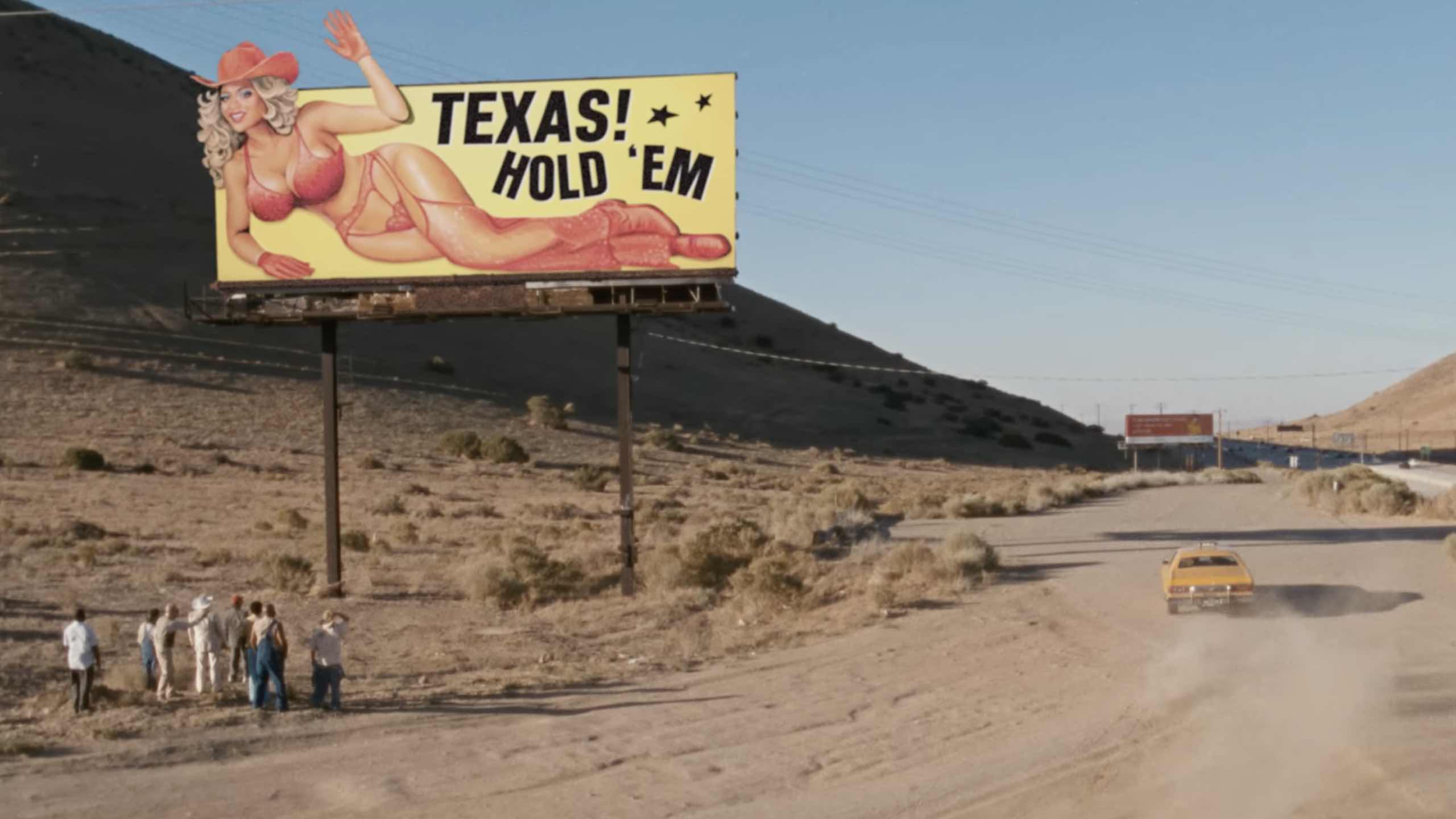Beyoncé announced her new album at this year’s Super Bowl with her hair feathered and volumized to the high heavens—though it was her metallic Stetson that caught most people’s attention. The announcement was obvious, given her similarly elevated cowboy attire at the GRAMMYs only a week before, and New York Fashion Week before that; Act II is a Western, baby. What immediately followed were hesitant murmurs about the album’s genre, which shifted to mild apprehension as the subtitle, Cowboy Carter, was revealed. It all seemed a bit dull for post-Lemonade Beyoncé.
Growing up in Bey’s home state of Texas made me acutely aware of and bored by modern country music. My grandma’s old records of Patsy Cline, Hank Williams, and Johnny Cash had staying power, but contemporary country—once described to me as “farm emo”—felt vapid. All the hooting and hollering for songs about trucks and dogs and beer was bad enough, but the people who listened to this music seemed troublesome. They owned guns and competitively rode horses at best; they were bigoted and cruel at worst. Thoughts of disappointment in Queen B bubbled, but I had yet to interrogate the implications of a Black woman making country pop and the potential reclamation of her correct assertion that she belongs here too.
Initially I chalked all this hubbub about the album up to pressure from a contemptuous music industry urging another female pop star to reinvent herself. They must want her to “go country,” a phenomenon satirized nearly 20 years ago in a season-four episode of 30 Rock in which Tina Fey’s fictional SNL stand-in The Girly Show faces dwindling viewership. Jenna Maroney, played by Jane Krakowski proclaims, “If it would help the show, I would be willing to ‘go county’…it’s a totally legitimate career move, Liz. The best way for a lady to get heat in this industry is to either record a country album or have a lesbian relationship.” The episode culminates in the newly minted Southern peach recording a rollicking Southern sports theme, “It’s Tennis Night in America.” The NBC executive cheers her yeehaw performance on. The “East Coast elitist” product is thus marketed to Middle America.
At the level of wealth and power that Bey has accumulated, perhaps she, too, is too far removed from the perceived pulse of America. Maybe her team suggested an appeal to more ordinary people. Lady Gaga shone bright in my recent memory. Fans were quick to forget Joanne, the 2016 album featuring the avant-garde artist in a pink cowboy hat. During her SNL (the real one) performance promoting the album, Beyoncé’s one-time collaborator dressed in fringe and played two chords of a hollow-body guitar while mostly twirling. Billboard said Joanne “was the only album of hers that feels like it lacks a distinct identity.” Carrie Underwood, Jessica Simpson, Darius Rucker, Tina Turner, The Pointer Sisters, and Cyndi Lauper have all made similar moves, while Lasso, Lana Del Rey’s upcoming album, promises to do the same.
Nelly and Lil Nas X did it, too, if only briefly. Originally from Austin, Nelly released a duet with Tim McGraw in 2004. While the song reached the top five on the Billboard Hot 100, he received considerable backlash from his label while he was in the process of creating it. Similarly, X’s “Old Town Road” was remixed with a feature from Billy Ray Cyrus. The massive hit debuted at #19 on the country charts, but was quickly taken down as its musical composition supposedly didn’t merit inclusion. As journalist Andrea Williams says in the documentary about Black musicians in Nashville, For Love & Country, “Perhaps one of the multitude of reasons, conscious or otherwise, of Black erasure in country [music] is the realities it would force white audiences and music executives to contend with. You can’t separate the industry that comes out of this place without talking about the ugliness of this place.”
Country music is Black music, and gatekeeping for the sake of a nonexistent white culture doesn’t negate that.
Melodies of early Southern country hits were often taken from the hymns of Black churches, and playing styles were derived from Black musicians. Bits of blues and jazz seeped into the genre, and other instruments were added, such as guitar and fiddle. Between the 1920s and ’40s, the white-owned record companies marketed what they called “race records” to the Black American population. This music included blues, jazz, gospel, country, and comedy, while “hillbilly records” were sold to rural white folks in the South. This period also saw blatant stealing. At this point the discourse usually involves a discussion about the lack of music copyright laws before the 1970s, or how The Beatles were “influenced” by Chuck Berry. While music is beautiful partially because it’s a space of collaboration, the incongruence is glaring.
Think of Big Mama Thornton, whose song “Hound Dog” was later released by two white artists: the Pennsylvanian vocal group Freddie Bell and the Bellboys and, years later, by Elvis. Thornton’s “Ball ’n’ Chain” would also be rerecorded by Janis Joplin in the late ’60s for the singer’s break-out solo record. Led Zeppelin stole from lots of musicians, including blues artists like Robert Johnson and Willie Dixon. The doo-wop song “Sh-Boom” by the ’50s Black R&B group The Chords was rerecorded and released by the sanitized Canadian quartet The Crew-Cuts to pop audiences. The list goes on, and the financial implications are irreparable.
Beyoncé’s single “Texas Hold ’Em” features banjo and viola player Rhiannon Giddens. The GRAMMY, Pulitzer, and MacArthur “Genius” Award winner has educated audiences for decades about the banjo’s roots in West Africa, most likely from the akonting, a three-stringed instrument with a gourd body. In the 19th century the banjo was horrifyingly used in minstrel shows by white performers. Bey is shining a spotlight on these artists and the history of country's music and culture. The truth is beautiful in its stoicism; country music is Black music, and gatekeeping for the sake of a nonexistent white culture doesn’t negate that.
Sometimes you can spot imminent change by the presence and persistence of a peanut gallery. TikTok users quickly scoffed that “Texas Hold ’Em” was irrefutably similar to the theme song of the early-’00s turtle cartoon, Franklin—which, to be fair, is true. Despite any doubt, the song debuted at #2 on the Hot 100, and Beyoncé became the first Black woman with the #1 single on the country charts. This isn’t Bey’s first rodeo, though, with criticism or cowboy boots. A native of Houston, she’s been immersed in country culture from a young age. She performed at her hometown’s livestock show and rodeo several times in the early stages of her career.
In 2021 Beyoncé released the “Ivy Park Rodeo” collection in collaboration with Adidas inspired by the Black, brown, and Native cowboy stories of American history. Her husband, JAY-Z, produced the film The Harder They Fall, which is based on real-life Black figures of the American West. Beyoncé seems to have retained ties to this crucial part of her identity, unlike the fiercely criticized J.Lo for her desperate clinging to “The Block” culture. The theme of “going country” builds complexity as a Black woman navigates the country space, a traditionally masculine and theatrically white space.
The theme of “going country” builds complexity as a Black woman navigates the country space, a traditionally masculine and theatrically white space.
Hanif Abdurraqib discusses Beyoncé in his collection of essays about Black performance and American Culture, A Little Devil in America. The writer, scholar, and poet says, “A fact that is talked about with Beyoncé both enough and somehow not enough at all is that her evolution as a performer is tied directly to her evolution with regard to vision, to seeing what might be possible in the world.” Is Cowboy Carter the next exploration of Bey’s southern Black lineage picking up where the monumental Lemonade left off? Is the intent for more white audiences to experience Black performers in white spaces? Is she the only musician who could truly pull off such a thing?
Tracy Chapman became the first Black woman to receive a Country Music Award in 2023 for her absolutely perfect 1988 folk banger, “Fast Car” after white, male country artist Luke Combs covered the song. Chapman won for Song of the Year as the writer, and Combs (annoyingly) for Single of the Year as the song’s performer. While covers are not necessarily an issue (Beyoncé appears to be covering “Jolene” on her new album), the trouble is an industry whose success is built on the talents of people whose histories have been overwritten, undervalued, overlooked and actively suppressed. Chapman’s song is about poverty, cycles of abuse, addiction, and ultimately the freedom that culminates in the chorus: “And I had a feeling that I belonged / I had a feeling I could be someone, be someone.”
This sense of belonging is an ache echoed by Beyoncé in a recent Instagram post. “This album […] was born out of an experience that I had years ago where I did not feel welcomed…and it was very clear that I wasn’t.” As an artist who called it quits with traditional interviews in 2014, Beyoncé took to social media this go-’round to ensure that there’s no miscommunication. That experience was undoubtedly the 2016 Country Music Awards. At the tail end of an earth-shattering year for Beyoncé, she sang “Daddy Lessons” alongside The Chicks (of “We’re Ashamed That the President Is From Texas” fame). There was a call for a boycott—a recording of the performance was taken down from the CMA’s website amid contention and later put back up again.
While Chapman later performed with Combs at the 2024 GRAMMYs, Beyoncé was watching in a cream cowboy hat. That night JAY-Z used an acceptance speech to call out the institution on behalf of his wife in a Kanye-like move: “She has more GRAMMYs than everyone, and never won Album of the Year. So even by your own metrics, that doesn’t work.” Jay has a point: Only 11 Black artists have won the GRAMMY for Album of the Year in its 66-year history, and the Black women can be counted on one hand. Beyoncé has won 32 GRAMMYs and has been nominated four times for Album of the Year.
As Muni Long discussed on the hip-hop morning show The Breakfast Club, referring to her early experiences as a Black country musician in Nashville, “Beyoncé has transcended that…she has so much notoriety and power and talent… it’s hard to hide behind the excuse that ‘this isn’t country, bless your heart.’ The lady is Beyoncé. You’re gonna play [her music on country radio stations and in country spaces] or you’re not, and if you’re not, there’s a reason why you aren’t and it’s very clear what that reason is.” Beyoncé has fuck-you money and the resulting privilege to operate outside of the constraints of most artists. She’s taking up her rightful space and making way for countless musicians after her. Between JAY-Z’s Tidal and Bey’s Renaissance, the power couple is engaged in controlling their products, image, and capital; they’re rewriting the long-established rules of this game.
Is Cowboy Carter the next exploration of Bey’s southern Black lineage picking up where Lemonade left off? Is the intent for more white audiences to experience Black performers in white spaces?
Beyoncé went on to say in her Instagram post, “because of that [CMA] experience, I did a deeper dive into the history of Country music and studied our rich musical archive.” The teaser video for “Texas Hold ’Em” and the song itself illustrate as much. After focus is pulled from a sun-baked Modelo bottle (accurate Texas imagery), an AM/FM radio dial is adjusted. “Maybellene” by Chuck Berry, “Grinnin’ in Your Face” by blues legend Son House, and what I believe to be the voice of Mike Johnson, a Black American country yodeler, are heard. Black artists are on the forefront in a country/folk/Americana space.
A romanticized popularity of cowboys can be attributed to their status as outlaws—cowboys as strong and silent types, cowboys as proverbial Robin Hoods, cowboys as Eastwood or Wayne or Fonda. While I like Tombstone as much as the next guy, “The reality of life in the American West was much more multiethnic,” says historian Stephen Aron for a PBS American Experience video. The Smithsonian also notes that “a significant portion of the workforce were people of color […] probably making up an eighth to a quarter of the cowboy workforce.” Despite growing up in Texas, I couldn’t name any Black cowboys despite the required years of “Texas History.” More recently films like Django Unchained and Nope have penetrated the zeitgeist, but nothing compares to the pride I feel seeing Beyoncé mounted on a horse dressed in the Texas flag. Maybe it’s not quite a country album, but it is a Beyoncé album that’s already got the wrong kind of white folks gasping. And that’s good enough for me. FL









